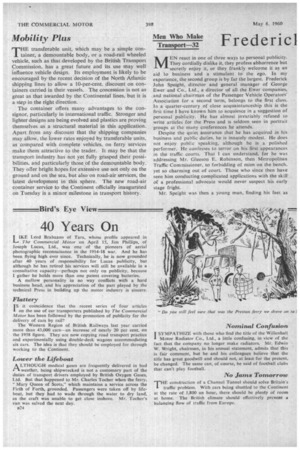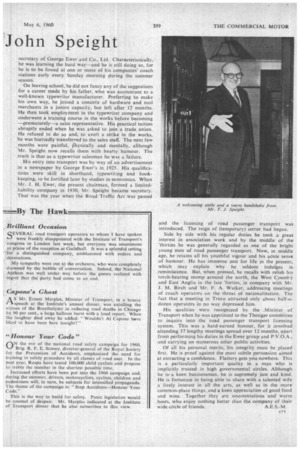Fredericl John Speight
Page 66

Page 67

If you've noticed an error in this article please click here to report it so we can fix it.
MEN react in one of three ways to personal publicity. They cordially dislike it, they profess abhorrence but secretly enjoy it, or they frankly welcome it as an aid to business and a stimulant to the ego. In my experience, the second group is by far the largest. Frederick John Speight, director and general manager of George Ewer and Co,, Ltd., a director of all the Ewer companies, and national chairman of the Passenger Vehicle Operators' Association for a second term, belongs to the first class. In a quarter-century of close acquaintanceship this is the first time I have known him to acquiesce in a suggestion of personal publicity. He has almost invariably refused to write articles for the Press and is seldom seen in portrait groups at the many conferences he attends.
Despite the quiet assurance that he has acquired in his business and public duties, he is innately modest. He does not enjoy public speaking, although he is a polished performer. He confesses to terror on his first appearances in the traffic courts. That I can understand, for he was addressing Mr. Gleeson E. Robinson, then Metropolitan Traffic Commissioner, so forbidding of mien on the bench, yet so charming out of court. Those who since then have seen him conducting complicated applications with the skill of a professional advocate would never suspect his early stage fright. .
Mr. Speight was then a young man; finding his feet as
secretary of George Ewer and Co., Ltd. Characteristically, he was learning the hard way—and he is still doing so, for he is to be found at one or more of his companies' coach stations early every Sunday morning during the summer season.
On leaving school, he did not fancy any of the 'suggestions for a career made by his father, who was accountant to a well-known typewriter manufacturer. Preferring to make his own way, he joined a concern of hardware and tool merchants in a junior capacity, but left after 12 months. He then took employment in the typewriter company and underwent a training course in the works before becoming —prematurely—a sales representative. His practical tuition abruptly ended when he was asked to join a trade union. He refused to do so and, to avert a strike in the works, he was hurriedly transferred to the sales staff. The next few months were painful, physically and mentally, although Mr. Speight now recalls them with hearty humour. The truth is that as a typewriter salesman he was a failure.
His entry into transport was by way of an advertisement in a newspaper by George Ewer's in 1925. His qualifications were skill in shorthand, typewriting and bookkeeping, to be fortified later by studies in economics. When Mr, J. H. Ewer, the present chairman, formed a limitedliability company in 1930, Mr. Speight became secretary. That was the year when the Road Traffic Act was passed and the licensing of road passenger transport was introduced. The reign of (temporary) terror had began.
Side by side with his regular duties he took a great interest in association work and by the middle of the 'thirties he was generally regarded as one of the bright young men of road passenger transport. Now, in middle age, he retains all his youthful vigour and his acute sense of humour. He has immense zest for life in the present, which may explain why he seldom indulges in reminiscence. But, when pressed, he recalls with relish his torch-bearing stomp around the north, the West Country and East Anglia in the late 'forties, in company with Mr. J. M. Birch arid Mr. F. A. Walker, addressing meetings of coach operators on the threat of nationalization. The fact that a meeting in Truro attracted only about half-adozen operators in no way depressed him.
His qualities were recognized by the Minister of Transport when he was appointed to the Thesiger committee to inquire into the road passenger transport licensing system. This was a hard-earned honour, for it involved attending 37 lengthy meetings spread over 12 months, apart from performing his duties in the Ewer group and P.V.O.A., and carrying on numerous other public activities.
Of all his personal merits, his integrity must be placed first. He is proof against the most subtle persuasion aimed at extracting a confidence. flattery gets you nowhere. This is a particularly important quality in a man who is implicitly trusted in high governmental circles. Although he isa keen businessman, he is supremely just and kind. He is fortunate in being able to share with a talented wife a lively interest in all the arts, as well as in the more common-place things, and a keen appreciation of good food and •wine. Together they are unostentatious and warm hosts, who enjoy nothing better than the company of their wide circle of friends. A.E.S.-M.




































































































































































































































































